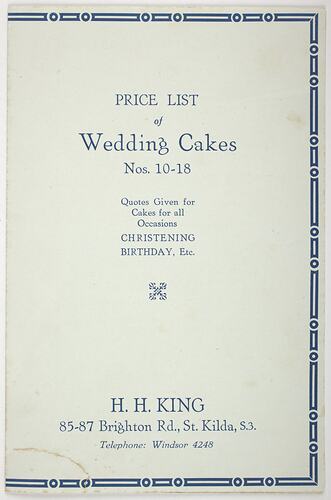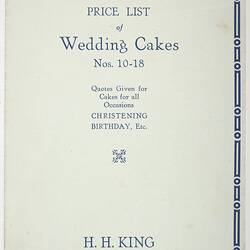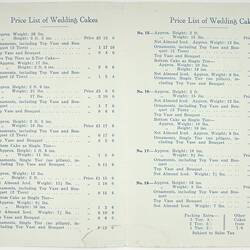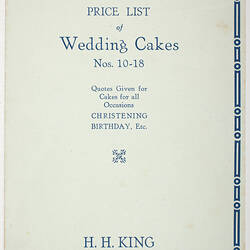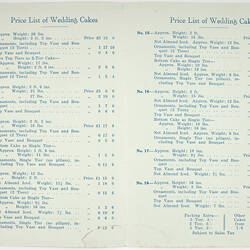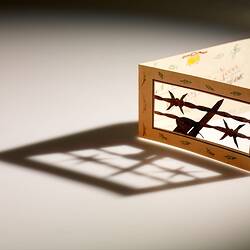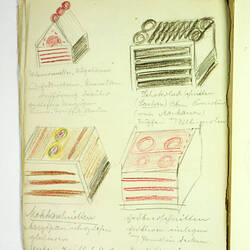Summary
This price list details prices for wedding cakes sold by H.H. King in Brighton Road St Kilda. It belonged to Karl Muffler, perhaps kept by him as a reference or point of comparison to prices at Ikinger's in Sydney Road Brunswick where he worked, or his own cake shop the Embassy in Glennferrie Road Malvern during the 1930s.
This item relates to Karl Friedrich Muffler, qualified pastry chef and confectioner, born in 1900, who migrated to Melbourne from Germany in 1930, aboard the passenger liner 'Balranald'. Muffler quickly established himself in Melbourne, commencing employment with Bill Ikinger (who had recruited and sponsored him) at his cake shop in Brunswick, as well as joining the long-running German establishment 'Club Tivoli'. Muffler went on to establish his own business, 'The Embassy' in Malvern, and in 1939 married fellow German migrant Mathilde 'Hilde' Mayer. At this time they were members of the 'German Labour Front' of which Adolf Mayer (Hilde's father) was president. On 4th September, 1939 Karl Muffler, along with dozens of other German residents (including his father-in-law), was placed into police custody as an enemy alien. He was transferred to Tatura internment camp and while there undertook woodcarving and drafting classes and worked as a cake decorator. He was transferred to a Forestry Commission camp in Broadford, and finally released in 1945. With no family left in Germany he decided to stay in Australia and became naturalised in 1947. After the war, Muffler accepted a position at William Angliss Food Trades School in Melbourne teaching ex-servicemen new skills in cake decoration. He maintained a connection to the German community though Club Tivoli and died in 1996.
Description of Content
Price list owned by Karl Muffler and perhaps kept as a reference or point of comparison to his own prices. Loose price list sheet for wedding cakes from 'Wedding Cakes; H.H. King 85-87 Brighton Rd St Kilda.
Physical Description
Loose price list sheet for wedding cakes from 'Wedding Cakes; H.H. King 85-87 Brighton Rd St Kilda.
Significance
This rich and diverse collection enables the exploration of a number of important historical themes, relating to migration as well as broader work and wartime narratives. Of key interest is the theme of working life and the proactive transporting of commercial and culinary traditions to Australia via the immigration process. Represented are the operational activities of pastry businesses around Melbourne in the 1930s, brought to life through the tools and business records. The collection of pastry tools will also fill a gap in the Museum's Trades collection which currently holds no material relating to commercial pastry making and decorating. The theme of internment and restriction of 'enemy aliens' during World War II is critical and a subject little represented in the existing collection, under both the migration and WWII homefront themes. There are a large number of documents held at the National Archives to complement this collection as well (copies in sup file and g drive).The internment camp drawings in particular are valuable and recognised as such by the Tatura Museum, and the internment currency will enhance the existing material in the Numismatics collection. The wooden tray is a fine example of internment craft and adds to the Museum's small existing collection. The travel permit also powerfully illustrates the experiences of 'enemy aliens' not interned but still subject to restriction and surveillance. This collection is also significant because it provides a comprehensive overview of a migrant's experience, from garnering qualifications in country of origin to migrating, establishing a working life as practitioner and teacher, community connections and the subsequent consequences of those activities; and the establishment of a domestic and social life, through marriage and ongoing cultural links, as well as the experience of loss through war, of those left behind.
The history of German migration to Australia stretches back over 150 years. By 1891, Germans made up the largest non-British group in the country. This demographic was not, however, to be sustained. The Australian government - in response to the events of World War I - curtailed German immigration, banning it in 1919. This official stance lasted until 1924, after which statistics reveal that there was little reversal in the trend on the part of the Germans who were discouraged from viewing Australia as a potential destination. By the census of 1933, the number of individuals in the country claiming German birth was at its lowest since 1856. Nevertheless Karl Muffler, one of the few Catholic German migrants who came to Australia in a period of universal economic depression, was recruited by a fellow German for his particular trade expertise. His profession would provide a framework for his life, as a commercial chef, as a dogged exponent of his craft while interned, as a teacher, and as a private practitioner within his domestic environment.
More Information
-
Collecting Areas
-
Acquisition Information
Donation from Ms Sue Muffler, 27 Apr 2005
-
Date Published
Karl Friedrich Muffler, Melbourne, Greater Melbourne, Victoria, Australia, 1930s
-
Inscriptions
Text, front cover: PRICE LIST/of/Wedding Cakes/Nos. 10-18/Quotes Given for/Cakes for all/Occasions/CHRISTENING/BIRTHDAY, Etc./H.H. KING/85-87 Brighton Rd., St. Kilda, S.3./Telephone: Windsor 4248.
-
Classification
-
Category
-
Discipline
-
Type of item
-
Overall Dimensions
146 mm (Width), 223 mm (Height)
-
Keywords
Forestry Camps, German Communities, German Immigration, Internment Camps
